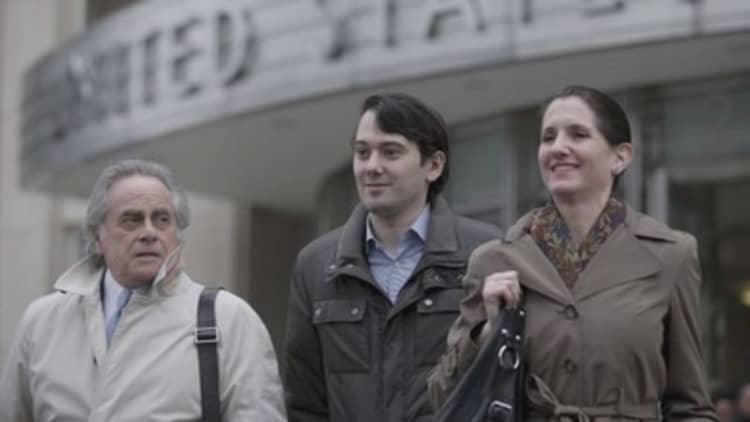
A bank account maintained by one of Martin Shkreli's hedge funds in July 2011 had a balance of "negative 33 cents" in it, at the same time he was telling investors his funds had tens of millions of dollars under management, an accountant testified Tuesday.
That accountant also said that an analysis of one of Shkreli's funds, MSMB Capital Management, showed that it never at any one point had a total of more than $1.2 million in its bank account and brokerage account combined.
And the combined balance of a brokerage account and several bank accounts maintained by his other fund, MSMB Healthcare, never topped $1.6 million, Wendy Spaulding, the accountant, testified in Brooklyn, New York, federal court.
Spaulding reviewed financial records of Shkreli's companies for prosecutors at his securities fraud trial.
She revealed Tuesday that Retrophin, a drug company founded by Shkreli, paid $10,000 for Jay-Z concert tickets at a time when the company had just tens of thousands of dollars in its own bank accounts.
And the accountant testified that records showed more than $1.3 million from Retrophin being transferred to Shkreli's personal bank account, and another $26,000 being transferred into that account from MSMB Capital.
Spaulding's testimony at Shkreli's trial is potentially damning because a series of investors have already told jurors that Shkreli claimed to have $30 million to $50 million in assets under management at his hedge funds before they placed their own money in those funds.
Prosecutors claim those investors were defrauded by Shkreli, 34, because of his allegedly misleading statements about his funds' assets and financial returns. Investors have said they received financial statements showing they were, as a rule, making money with his funds after putting in hundreds of thousands of dollars.
Shkreli has pleaded not guilty in the case.
Spaulding testified that the balances of the hedge funds he ran were often much less than even the $1.6 million maximum she had detailed.
For example, in September 2012, when Shkreli notified investors in MSMB Healthcare that he was closing that fund, and offered to redeem their funds, the balance of MSMB Healthcare's bank account was $632.16, Spaulding said.
Prosecutors also accuse Shkreli of looting Retrophin of money and stock to pay off investors in his hedge funds once they began demanding the redemption of their investments in cash.
Those investors also have said that Shkreli told them his hedge funds had a balance of long and short positions in publicly traded stocks, and that the funds as a rule did not have more than 10 percent of their investments in any single company.
But Spaulding's testimony suggests that MSMB Healthcare was heavily investing in the start-up of Retrophin, which Shkreli ran at the time.
Spaulding detailed how hundreds of thousands of dollars flowed from MSMB Healthcare into Retrophin, which he founded in 2011. She also identified how large amounts of money also went back into the hedge fund from Retrophin.
When an investor named Michael Lavelle on Feb. 3, 2012, wired a total of $850,000 to MSMB Healthcare, Spaulding said, a total of $900,000 was wired by the fund to Retrophin on the same day. Two days before, the hedge fund had gotten $100,000 from another investor named Richard Kocher, who has testified he believed Shkreli was investing in tradeable stocks, which Retrophin was not at that time.
Spaulding also testified that MSMB Capital had a net asset value of $1.1 million at the end of January 2011. But by the end of the next month, February 2011, the fund had just $55,786.86, she testified.
Witnesses have testified how Shkreli's fund made a disastrous short sale trade in Orexigen Therapeutics in early February that year, one that "imploded" the fund, and left it with a debt of $7 million to Merrill Lynch, which handled its trading.
Asked how much stock was being held by MSMB Capital at the end of February 2011, Spaulding answered, "Zero."
Despite that, investors have said, Shkreli sent out statements showing positive returns for their money placed into MSMB Capital.


